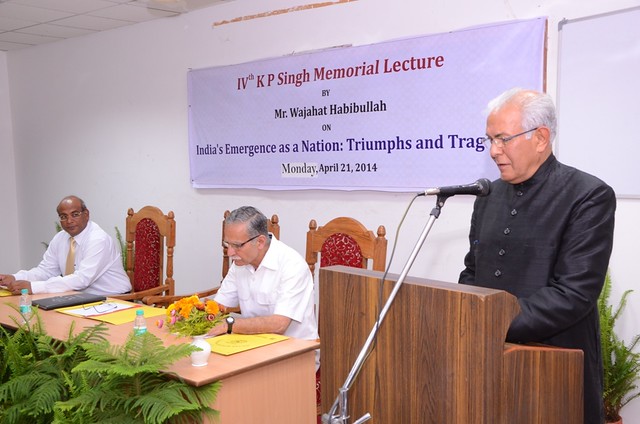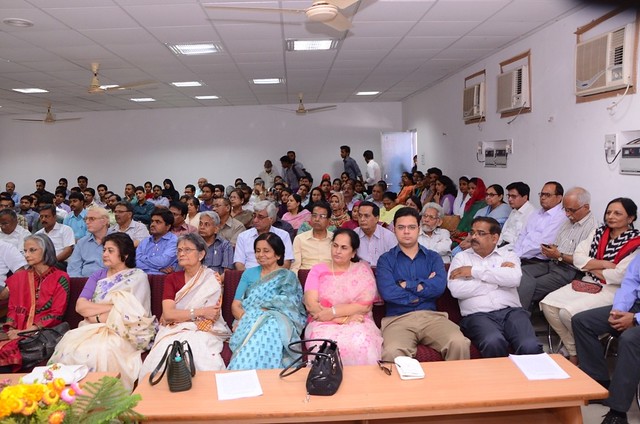By TCN News,
Aligarh: The former Chairman of the National Commission for Minorities, Mr. Wajahat Habibullah, today expressed his concern on incidents of “targeted communal violence” in the country in which the police force had reportedly played a dubious role.
Delivering the fourth K. P. Singh Memorial Lecture on “India’s Emergence as a Nation: Its Triumphs and Tragedies” at the Aligarh Muslim University today, Habibullah made a scathing attack on the partiality of the police force saying, “Disturbingly, all cases of communal violence investigated by the National Commission for Minorities followed a trend of police complicity, wherein the police had colluded not only with the dominant community but also with aggressive groups to perpetrate violence”.

Mr. Wajahat Habib Ullah delivering the IVth KP Sing Memorial Lecture at AMU.
Elaborating the short comings in the justice delivery system, which presently prevails as far as victims of communal riots are concerned, Habibullah, who is also a former Secretary to the Government of India, said, “Existing provisions of the Indian Penal Code (IPC) have proved inadequate in addressing targeted violence in the country”.
Habibullah said that in the year 1986, the then Prime Minister, Rajiv Gandhi had himself taken the initiative in investigating the role of the police in the communal violence in Hashimpura in district Meerut, following the custodial death of 40 Muslim youth. He pointed out that despite the then Prime Minister’s intervention, “this case still lingers in the session courts and all accused policemen continued in regular service and many of them retired with honours”.
Habibullah regretted that the country lost an opportunity of containing such targeted violence when the “Communal and Targeted Violence Prevention Bill” was torpedoed in the last session of the Parliament. Habibullah said, “The most remarkable of the proposed legislation was that it held public servants accountable for their negligence or willful failure in controlling riots. This bill would have also given the right to the victims to be heard during the procedure of trial and made more victim friendly including the provision of victim protection”.
Expressing his dismay over the manner in which this important piece of legislation was shot down by certain vested interest, Habibullah said, “The Draft Bill which failed to get approval of the Parliament, was attacked by right-wing groups for being ‘anti-Hindu’, though Hindu minorities too, were covered under the bill in states where they form a minority population”.
Habibullah lamented, “The government and civil society at large overlooked the need to address the discrimination, exclusionary practices and insecurities faced by the Muslim community on a daily basis. The Muslim community is clueless with how to deal with an open and certain discrimination”.
Referring to the economic plight of the Muslims, despite the advent of a number of poverty alleviation programmes meant for their economic emancipation, Habibullah said, “Compared to the SCs and STs and other social and religious groups, while urban poverty in 2011 was the highest among Muslims, rural poverty among Muslims was also higher than that of other religious groups and of other Backward castes (OBCs). Besides, as will be evident from statistics, the rate of decline in poverty has also been the slowest in the Muslim community even when compared to the SCs and STs”.
Referring to a recent official report on urban literacy, Habibullah said, “If we compare the rate of increases in literacy among Muslims with other social and religious groups including the SCs, it is once again the lowest”.
Quoting from the Justice Ranganath Mishra Report on Religious and Linguistic Minorities, Habibullah said, “The condition of Muslims in general are lower than Hindu OBCs who have the benefit of reservation and recent attempts by the central government to introduce 4.5 reservation to Muslim OBCs within the OBC quota have met with resistance”.
Quoting again from the Ranganathan Mishra Committee Report, Habibullah said, “Muslims have been denied of equal participation in the development process”.
Referring to the impact of the follow up measures, following the recommendations of the Justice Sachar Committee Report, Habibullah said that there was no denying that various flagship programmes for minority development had been initiated by the central government with the objective of alleviating the miserable economic condition of the Muslims. These remedial measures may have led to a limited amelioration in the economic condition of the Muslims, but tardy implementation was a big hurdle in getting the desired results.
Citing the findings of a recent report based on a study by the Centre For Equity Studies on the Impact of the Sachar Committee Follow Up measures, Habibullah said, “The study which covers three districts in the states of West Bengal, Bihar and Haryana indicates that despite focus on minority districts, Muslim communities were not benefitting much because officials were often under orders to avoid Muslim villages”.
Habibullah said, “Instead of spending funds to upgrade schools in Muslim villages, these funds were spent on neighbouring non-Muslim villages”.
Referring to the political impact of this harsh reality of exclusion felt by the Muslim community, Habibullah said, “There is now a growing political consciousness in the Muslim community which has made a decisive use of its franchise in election”.
Habibullah said that in a democracy no group should feel excluded because this could only lead to the weakening of the nation as a whole. “Europe had to pay a heavy price for cleaving to a narrow concept of nationhood and the European had to ultimately undertake fitful step towards building a multi-nationality state”.
He called upon every section of Indian society to take upon the Right to Information Act for ensuring accountability and transparency in governance. This Act, he said, was among the world’s strongest weapons for ensuring justice to all sections of the people.

In his presidential remarks on Habibullah’s address, the Vice Chancellor of Aligarh Muslim University, Lt. Gen. (Retd.) Zameer Uddin Shah said that the challenges facing the Muslim community could only be fully addressed if the community itself was prepared to play its due role in poverty elimination. Shah said, “The major thrust of the Muslim community has to be on education and this objective could largely be achieved by reforming and improving the quality of education of Muslim Madrasas all over the country”. He said that AMU has started a Bridge Course for Madrasa pass outs to enable them join the mainstream courses in the University.
Shah said that as far as discrimination was concerned, “Muslims do not need just riot free society but more so they need a discrimination-free society”.
Earlier, Dr. Tariq Islam, Coordinator, K. P. Singh Memorial Lecture welcomed the guests.
Prof. Wasi Haider highlighted the works and contributions of Prof. K. P. Singh. He said that K. P. Singh was a great soldier of secularism. He had a liberal and left values. He donated his body to the J. N. Medical College Hospital of the University for academic purposes.
AMU Pro-Vice Chancellor, Brigadier (Retd.) Syed Ahmad Ali graced the lecture. On this occasion, Prof. K. P. Singh’s family was also present in the lecture.

